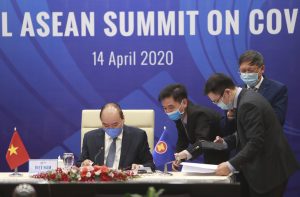2020 is a crucial year for Vietnam’s diplomatic success — and once looked to be a promising one, with Hanoi holding the rotating chair of the Association of Southeast Asian Nations (ASEAN). However, the COVID-19 pandemic has changed the game.
As of August 7, Vietnam had reported a total of 784 COVID-19 cases, of which 395 people have recovered. The Southeast Asian country recorded 10 deaths from COVID-19, after avoiding any fatalities until July 31. Although such figures still position Vietnam as one of the world’s most successful countries in fighting COVID-19, the recent deaths complicate Hanoi’s diplomatic efforts.
After taking the rotating ASEAN chairmanship from Thailand, Vietnam focused on being a bridge among ASEAN’s members, as well as between with ASEAN and external powers, in uncertain times. As Vietnamese Prime Minister Nguyen Xuan Phuc put it at the ASEAN Summit in Bangkok in November: “In 2020, we want to focus on strengthening ASEAN’s sustainable cohesion by upholding solidarity and unity, increasing economic links and connectivity, deepening values and identities of ASEAN members, improving the efficiency of the ASEAN apparatus, and promoting ASEAN partnerships in the global community.”
Vietnam’s leading role in ASEAN also benefits Hanoi’s interests in the South China Sea. The country has been trying to push forward negotiations for the Code of Conduct (COC) this year. A legally binding COC would play a vital role for Vietnam and the region in general, as China keeps playing for time and at the same time accelerating its ambition to gain control over the South China Sea.
If buying time is China’s goal, COVID-19 will help. On June 26, the 36th ASEAN Summit was forced to be held online due to concerns over the pandemic. And the current situation is expected to badly affect Vietnam’s efforts to organize a face-to-face ASEAN Regional Forum (ARF), as well as the East Asia Summit (EAS). In an interesting twist, Da Nang, the city chosen to host the 36th ASEAN Summit, is now Vietnam’s coronavirus epicenter. As a result, Vietnam is seeking ways to make sure that the ARF and EAS summits would be held in person in the next four months.
The disruption due to COVID-19 has led to speculations over the possibility of Vietnam seeking an extra year as ASEAN chair. But so far, it is understood that Hanoi has no intention of doing so. Instead, Vietnam’s leadership is seeking to continue its multilateral diplomacy and diversification strategy.
Multilateral diplomacy is probably the best thing for Vietnam at the present. And it works. Vietnam has gained notable positive results over the past months, including the elevation of Vietnam-New Zealand relations to a strategic partnership, announced by Prime Minister Nguyen Xuan Phuc and his New Zealand counterpart Jacinda Ardern on July 22. In the joint statement resulting from their talks, Vietnam and New Zealand also mentioned the South China Sea and the 1982 United Nations Convention on the Law of the Sea (UNCLOS). Following the elevation of bilateral relations with New Zealand, Vietnam had more good news from Australia, as Canberra publicly rejected China’s South China Sea claims in a note verbale submitted to the Commission on the Limits of the Continental Shelf (CLSC).
To Vietnam, interactions with New Zealand and Australia remind it of the “Quad Plus,” a concept that was cited by Indian media after a virtual conference that focused on the coronavirus pandemic in April. The teleconference included the participation of the “Quad” (the United States, India, Japan, and Australia) and the “Plus” countries (Vietnam, New Zealand, and South Korea). The Vietnamese media tends to link the “Quad Plus” to another yet-to-be-confirmed plan made by the United States dubbed as the “Economic Prosperity Network,” which is said to focus on removing global industrial supply chains from China. On that front, Reuters has cited a statement of U.S. Secretary of State Mike Pompeo, who said that the U.S. government is working with Australia, India, Japan, New Zealand, South Korea and Vietnam to “move the global economy forward.”
Amid the COVID-19 crisis, instead of escalating tensions with China, Vietnam’s silent strategy is now clear: taking advantage of its attractive geopolitical role to pursue its own national interests.
Du Nhat Dang is a Vietnamese reporter who works for Tuoi Tre newspaper in Vietnam. He graduated from the Faculty of Journalism and Communication, University of Social Sciences and Humanities in Ho Chi Minh City. He is a fellow at the Reporting ASEAN program, which supports articles about ASEAN.

































